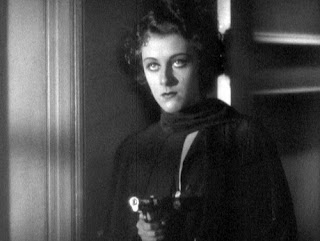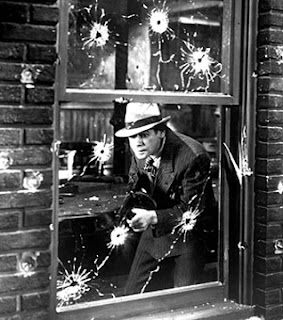Firstly, I have never seen the Al Pacino version of this film. I know. I know. It's on my list. I love gangster films so I thought I'd start at the beginning. Ultimately, the joke is on you because I'll be the one who gets all the references to earlier films.
So this is Scarface. Produced by Howard Hughes who had a reputation for doing whatever the fuck he wanted. Because he could. Seriously, the man had so much money that he could afford to tell everyone on the planet to go fuck themselves and suffer absolutely no ill consequences whatsoever.
You know it's a good movie because it starts with a disclaimer telling the audience that the film is not meant to glorify criminal life. But let's be real. All the cops and newspapermen are douchebags while all the gangsters, with the possible exception of Johnny Lovo, are badasses. I don't consider myself a violent person, but if I had a driver and a tommy gun and a house full of enemies....well...it's just such a shame that in an age of DNA testing, fingerprint databases, cell phone tracking and the patriot act; you just can't get away with shit like you could in the good old days. And so we live vicariously.
 |
| Tony Comante |
This is Tony Comante (Paul Muni), just a small time thug who gets caught up with the usual suspects after the untimely assassination of Italian mob boss, Big Louis Costillo. In all likelihood, he's guilty as sin, but he's cool. He ain't afraid of no copper. Under interrogation, he says, "What kinda mug ya think I am? I don't know nothin'. I don't see nothin'. And I don't hear nothin'. And when I do, I don't tell no cop. Ya understand?" I love it. So, Johnny Lovo's shady lawyer shows up and bails Tony out. See, Lovo's got aspirations to take over the southside and he's making Tony his lieutenant. Tony has a friend, Guino Rinaldo (George Raft) and a kid sister, Cesca (Ann Dvorak). You can probably guess where that's going. Anyway, he hooks Guino up with a job and some cash from Lovo.
 |
| Guino Rinaldo |
 |
| Cesca and Tony Comante |
|
|
Kid sister Cesca is clearly a slut, but Tony dotes on her and is VERY protective. He gives her some money too. He doesn't realize that she's got a thing for his friend Rinaldo.
Tony works in what you might call the "marketing department" of Johnny Lovo's southside gang. His job entails going to speakeasies and informing them that he will be supplying their beer from now on. If they have a problem with that, he shoots someone. Not a bad job for a young Italian. Unfortunately, he's a little too trigger-happy and the next thing you know, Lovo is getting a dead body delivered on his doorstep with a note attached, "Stay out of the Northside." Now, Johnny specifically warned Tony to stick to his territory. The Northside is controlled by the Irish mob headed by some guy named O'Hara. But Johnny Lovo isn't really cut out for management. Not only is Tony ignoring orders, but he's moving in on Johnny's girl, Poppy.
 |
| ...right under Johnny's nose. |
And then we get to the film's first drive-by shooting. O'Hara's gang drives by Johnny's headquarters and blasts them with machine guns. Where most men would be defeated, or at least a bit shaken up, Tony's only thoughts are, "omg those are so cool where can I get one???" So he gets himself a machie and heads out with his cronies to take over the northside, much to Lovo's dismay.
The next 20 minutes or so is mostly a series of drive-by shootings from Model Ts, collateral damage, firing squads and dead Irish mobsters everywhere. O'Hara is pissed. So is Johnny Lovo, but who cares about him?
 |
| whatever...I do what I want! |
Meanwhile, sister Cesca is eager to prove that she's all grown up. She shows up at the club in a slinky dress and starts hitting on Guino Rinaldo, who knows better than to bang Tony's sister. Tony forcefully escorts her out of the club and takes her home where he roughs her up a bit. He tears the strap of her dress, exposing more boob than you will see in a film until 1968. Seriously, this is what
pre-code films are all about.
So...I won't ruin the rest of the movie for you, but basically, Cesca and Guino get married secretly, planning to surprise Tony later. At the same time, Johnny Lovo puts a hit out on him. Tony catches Guino with his sister in a hotel room and, clearly under a lot of stress, shoots Guino point blank. Cesca tearfully explains that they'd been married and Tony is sorry, but not THAT sorry.
At this point in the movie, the whole cast is dropping like flies. You may wonder who will still be alive for the final battle. Is there even going to be a final battle? Maybe everyone dies and then the screen goes black. No no. If that were the case, you wouldn't need a disclaimer at the beginning.
So let's take inventory. Who is still alive?
 |
| Cesca.....and some cops. |
Except Cesca wants to kill her brother. But then she changes her mind and decides that she'd rather kill cops. Nice girl.
 |
| and so... |
Actually, there are 2 endings. The censors hated both of them, so Hawkes went with the good one. And boy is it a HONEY.
Scarface is one of the shining jewels of the Pre-Code era, a short time just after the widespread distribution of
talking pictures, but before anyone really gave a crap what filmmakers chose to portray in film. Well there were some groups that cared, religious groups and such would boycott on behalf of the children. And technically, there was the Hays Production Code prohibiting gratuitous violence and portrayals of sex and drugs, but Hollywood Producers hired a guy to be in charge of enforcing the code and then paid him off to do nothing. The system worked quite well for the years between 1929 and 1933. There is a very good
documentary about the pre-code era produced by Turner Classic Movies that is very much worth watching if you're interested in this sort of thing. Movies made during this time were much more adult, more violent, more risque, and absolutely fascinating to watch. Also consider the time period, just after the wall street crash of 1929, these movies portray the general zeitgeist of the time more accurately than any film would do for a long time to come. Despite being so titillating, pre-code films would often have more adult themes and were often intellectual as well as smutty. Sadly, the Catholic Legion of Decency saved the day and a generation of children grew up believing that Andy Hardy was realism. The production code had some really ridiculous rules, more ridiculous than Lucy and Desi's twin beds, that clever directors and writers would carefully slip past the censors, but that is a discussion for another time.



















